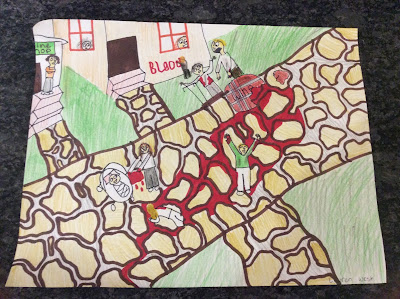Lauren West
Period 4
Ed Kennedy and a
small girl with and abusive father share a powerful moment showing
what doesn’t kill you makes you stronger in the story I Am the Messenger Markus
Zusak. In this book, local cab driver Eddie Kennedy
accidentally spoils a bank robbery, causing him to become a local
hero. His glory soon ends, however, when Eddie receives a mysterious
card implying that he continues his hero streak.
Being the curious man he is,
with a less than exciting life Ed Decides to check out the
stories behind the card. Eddie goes through the second and third
assignments on the card before returning back to the first, more challenging
task. Although the card only has the addresses of houses and certain time
increments, Eddies finds it quite simple to decipher the hidden purpose
within each house. When Ed first approaches the first house, he figures the
situation out immediately. A woman is featured as the victim of rape, by her
alcoholic husband. Ed knows he has to help her, but is not sure exactly how he will manage to do so. As he returns each night he learns this is indeed a pattern,
and also that the abused woman has a daughter, Angelina, who sits on the
house porch and cries each night when her father abuses her mother. One scene from
this story that struck me as powerful was the scene following Eddie’s decision
to confront the man. As Eddie stood contemplating whether or not he should
enter the house, routinely the small girl Angelina came outside to sit on her
porch. When she first notices Eddie, Angelia looks at him with a hopeful
expression and says, "Are you here to save us?"(Zusak 78). This quote
shows how Angelina has been waiting for someone to come save her, and that she
is very hopeful for change. When Ed can't resist saying no to her, and assures
her that he wants to help, she begins to exhibit a large amount of strength.
She shows how her life experiences have shaped her into a stiff person with low
expectations as Zusak writes, “Even a girl of about eight years can see there’s
almost no rescue from her life”(Zusak 78). This scene is specifically powerful
because the author shows this girl, no older than the age of eight, going
through such a tough time that she’s so desperate for someone to help her she
will look to a stranger trying to help with awe. The girl is so pressured that
even when someone is offering help, she remains strong and untrusting, and she
does not outright give in. The part of this scene that really made me think was
when the author shows this girl as such a brave and accepting person after all
she’s been through. When Ed fails to confront her father, Angelina understands
beyond Ed’s belief. Ed observes, “I think she understands how physically
powerful her father is and how scrawny I am.
All she does is stumble over to me and hug me again…‘Thanks for at least
trying, Ed” (Zusak 79). Ed realizes how strong this girl is and how weak he is.
This little girl is incredibly understanding as she leaves the house and waits
for the noise to end, does not get her hopes up with Ed, and understands Ed’s
fear of her father. This girl grows up with a horrible home situation, yet she
remains strong and goes back into the house, which Ed had failed to do.
I believe
that when we see a bad home situation, we all assume the child will be damaged.
Whether they will grow to be a criminal, or a outright bad person, we
cannot help but assume no good could come from bad. Yet what we forget is
sometimes people gain strength from trying times. In this scene from I Am the Messenger eight year old
Angelina learns this as she exhibits strength and understanding in her
conversation with Ed.

